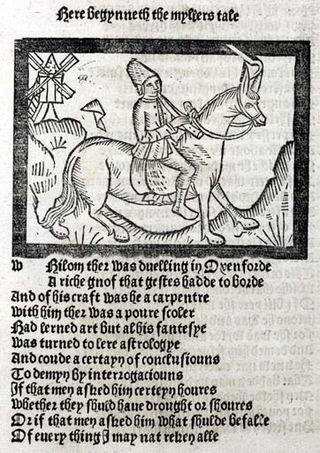
Back Middelengels Afrikaans Idioma anglés meyo AN Middelenglisc spræc ANG اللغة الإنجليزية الوسطى Arabic Inglés mediu AST Сярэднеанглійская мова Byelorussian Средноанглийски език Bulgarian মধ্য ইংরেজি Bengali/Bangla Krennsaozneg Breton Anglès mitjà Catalan
| Middle English | |
|---|---|
| Englisch English Inglis | |
 A page from Geoffrey Chaucer's The Canterbury Tales, published in the late 14th century | |
| Region | England (except for west Cornwall), some localities in the eastern fringe of Wales, south east Scotland and Scottish burghs, to some extent Ireland |
| Era | developed into Early Modern English, and Fingallian and Yola in Ireland by the 15th century |
Early forms | |
| Latin | |
| Language codes | |
| ISO 639-2 | enm |
| ISO 639-3 | enm |
| ISO 639-6 | meng |
| Glottolog | midd1317 |
Middle English (abbreviated to ME[1]) is a form of the English language that was spoken after the Norman Conquest of 1066, until the late 15th century. The English language underwent distinct variations and developments following the Old English period. Scholarly opinion varies, but the University of Valencia states the period when Middle English was spoken as being from 1150 to 1500.[2] This stage of the development of the English language roughly coincided with the High and Late Middle Ages.
Middle English saw significant changes to its vocabulary, grammar, pronunciation, and orthography. Writing conventions during the Middle English period varied widely. Examples of writing from this period that have survived show extensive regional variation. The more standardized Old English literary variety broke down and writing in English became fragmented and localized and was, for the most part, being improvised.[3] By the end of the period (about 1470), and aided by the invention of the printing press by Johannes Gutenberg in 1439, a standard based on the London dialects (Chancery Standard) had become established. This largely formed the basis for Modern English spelling, although pronunciation has changed considerably since that time. Middle English was succeeded in England by Early Modern English, which lasted until about 1650. Scots developed concurrently from a variant of the Northumbrian dialect (prevalent in northern England and spoken in southeast Scotland).
During the Middle English period, many Old English grammatical features either became simplified or disappeared altogether. Noun, adjective, and verb inflections were simplified by the reduction (and eventual elimination) of most grammatical case distinctions. Middle English also saw considerable adoption of Anglo-Norman vocabulary, especially in the areas of politics, law, the arts, and religion, as well as poetic and emotive diction. Conventional English vocabulary remained primarily Germanic in its sources, with Old Norse influences becoming more apparent. Significant changes in pronunciation took place, particularly involving long vowels and diphthongs, which in the later Middle English period began to undergo the Great Vowel Shift.
Little survives of early Middle English literature, due in part to Norman domination and the prestige that came with writing in French rather than English. During the 14th century, a new style of literature emerged with the works of writers including John Wycliffe and Geoffrey Chaucer, whose Canterbury Tales remains the most studied and read work of the period.[5]
- ^ Simon Horobin, Introduction to Middle English, Edinburgh 2016, s. 1.1.
- ^ Fuster-Márquez, Miguel; Calvo García de Leonardo, Juan José (2011). A Practical Introduction to the History of English. [València]: Universitat de València. p. 21. ISBN 9788437083216. Retrieved 19 December 2017.
- ^ Horobin, Simon; Smith, Jeremy (2002). An Introduction to Middle English. Oup USA. ISBN 978-0-19-521950-0. Retrieved 2023-12-01.
- ^ Carlson, David. (2004). "The Chronology of Lydgate's Chaucer References". The Chaucer Review. 38 (3): 246–254. CiteSeerX 10.1.1.691.7778. doi:10.1353/cr.2004.0003. S2CID 162332574.
- ^ The name "tales of Canterbury" appears within the surviving texts of Chaucer's work.[4]